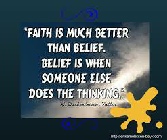



 NEXT
NEXT
 BACK
BACK
 Forum
Forum


Philosophical musings on Quanta & Qualia; Materialism & Spiritualism; Science & Religion; Pragmatism & Idealism, etc.




Faith is when someone else does the reasoning


Post 42. 06/25/2018
Faith versus Belief
Religious Doctrine vs Scientific Theories
Faith, in the sense of Hope, Trust, Confidence & Optimism, is a valuable resource for humans facing a world of setbacks and challenges. It motivates perseverance despite delays and difficulties. But the term is also used to denote a particular paradigm or belief system. In the sense of "my orthodox Faith" or "your apostate Faith", it becomes a divisive force, creating categories of Us versus Them, with no allowance for overlap. A religious "faith" is a set of beliefs or doctrines that must be distinguished from other, erroneous, faiths.
In discussions on controversial religious topics, Christians typically use the terms “faith” and “belief” interchangeably. They have been indoctrinated to assume that all religious questions have True/False answers. For example, “abortion is either A> a medical procedure, or B> murder. No allowance is made for extenuating circumstances, such as rape or danger to the mother. Since they find this two-
Scientists are humans with their own personal biases, but in their work they are taught to avoid presumptions and binary positions (yes-
Christian “faith” is based on unquestioning trust in the Word of God, as recorded in “infallible” ancient scriptures. But scientific beliefs must be "falsifiable". For scientists, doubt is a virtue, and only concepts that survive skeptical scrutiny are accepted as reliable theories of how the world works. Consequently, the scientific body of knowledge is always evolving as new dis-
Enlightenment era Deism, as a worldview, was modeled on the scientific approach that produced the radically new cosmo-
Unfortunately in both Religion and Science, some truths are not so obvious to the naked eye or untrained mind. So the arcane meaning of “scripture" or "nature” is typically mediated & promulgated by a cabal of experts, either Priests or Physi-
Post 42 continued . . . click Next
Faith is . . .
Faith means belief in something concerning which doubt is theoretically possible.
___William James
Faith consists in believing when it is beyond the power of reason to believe.
___Voltaire
Faith is not a reason. Uttering “because I have faith” only changes the question from why do you believe to why do you have faith. The only difference is that you have removed evidence from the list of possible answers. Faith is simply believing that something is true because you want it to be true. That is neither honest nor something to base real world decisions on.
___www.truthsaves.com
Faith is wishful thinking.
___Gnomon
Wishful thinking is the formation of beliefs and making decisions according to what might be pleasing to imagine instead of by appealing to evidence, rationality, or reality. It is a product of resolving conflicts between belief and desire.
___https://en.wikipedia.org/wiki/Wishful_thinking
Faith is fossilized belief.
___Gnomon
Faith is belief without evidence and reason, coincidentally, that’s also the definition of delusion.
___Richard Dawkins
Delusion :
an idiosyncratic belief or impression that is firmly maintained despite being contradicted by what is generally accepted as reality or rational argument, typically a symptom of mental disorder.
___Wiktionary
Faith
with a thousand faces :
According to some estimates, there are roughly 4,200 religions in the world. The word religion is sometimes used inter-
____Wikipedia
Six articles of faith or “Iman”
• Belief in Allah
• Belief in the angels
• Belief in the books
• Belief in the prophets
• Belief in day of judgment
• Belief in Allah’s divine knowledge
Faith is not belief. Belief is passive. Faith is active.
____Edith Hamilton
Faith is acting on desires instead of knowledge.
___Gnomon
Faith is not belief without proof, but trust without reservation.
___ Elton Trueblood
Trust without reservation is the only option for the vulnerable, weak, helpless, and impotent. In other words, “slaves”
___Gnomon
Trust but verify.
___Ronald Reagan
